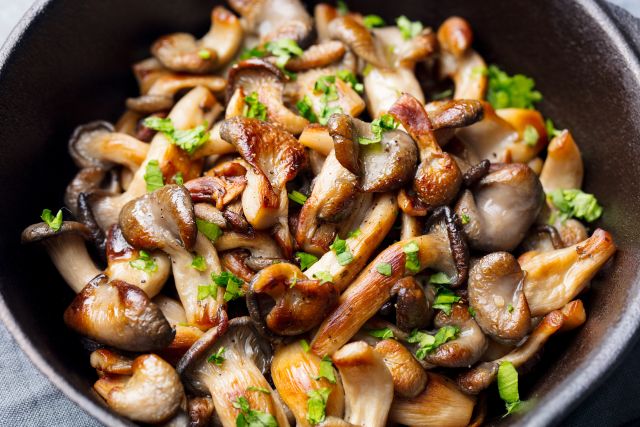Updated on August 5, 2022.
Many supermarkets these days carry a range of mushrooms in all different shapes, sizes, and even colors. If you’ve ever wondered whether you should try them, here are reasons why they can be a great addition to an overall healthy diet. You can even replace less-healthy foods like red meat with mushrooms for added health benefit.
Though you may be surprised to hear it, mushrooms are nutritional rockstars. They’re high in fiber, antioxidants, and minerals, such as selenium, potassium, magnesium, B vitamins, vitamin C, and vitamin E. They’re cholesterol-free, low in calories, and have virtually no fat, salt, or sugar. And, while exact amounts vary depending on the type of mushroom you choose to eat, they can also be high in protein.
Take the white button mushroom, for example, the most common type of mushroom in the supermarket. Did you know that it contains about 38 percent protein?
While some types of mushrooms do supply some essential amino acids (the building blocks of proteins that your body can’t make on its own and that you need to get from your diet), they don’t supply the full complement that animal proteins offer. That said, by combining mushrooms with other plant proteins, you can get a complete protein.
Potential health benefits of mushrooms
A wide range of potential health benefits have been investigated for different types of mushrooms. The list includes improving immune function, decreasing inflammation, treating infections, thinning blood, decreasing blood pressure, treating obesity, and improving cholesterol and blood sugar levels. So far, much of the research has been done in the lab or in animals, and more research is needed in humans.
One small randomized controlled trial looked at the effect of substituting white button mushrooms for beef. The study included 73 people with obesity who were randomized to a standard meat diet or a diet that replaced red meat with mushrooms. Over the course of one year, the people assigned to the mushroom diet lost an average of seven pounds and kept it off. Other health factors also improved: They lost about 2.5 inches around the waist, had lower blood pressure, and improved cholesterol levels. The study was published in the journal Appetite in 2013.
Mushrooms as medicine?
While medicinal mushrooms have been used for thousands of years in Asia, western medical research has only just begun to investigate them. Some scientists have started looking for compounds in mushrooms that could potentially prevent or treat cancer or relieve symptoms and side effects related to cancer treatment.
Early clinical trials have mainly looked at potential anti-cancer compounds in three types of mushrooms: shiitake, turkey tail mushroom, and reishi mushrooms. The focus has been on using mushroom compounds as adjuvants, a treatment that is added to cancer or other medical therapies to help improve response to treatment or to decrease side effects. The majority of these studies have looked at breast cancer, colorectal cancer, and prostate cancer.
One study looked at the safety and effectiveness of lentinan, a compound that comes from shiitake mushrooms. The study included 80 people with advanced colorectal cancer. Results suggested that taking lentinan for 12 weeks helped decrease side effects to chemotherapy and was associated with improved quality of life. The study was published in the journal Anticancer Research in 2009.
Because most studies in humans in this area have been small, drawing conclusions from them is difficult. More research is needed in larger groups of people. Because some herbs and supplements can interact with medications, always talk with your healthcare provider before starting a new one or making any changes to your current medications.
A shopper’s guide for mushrooms
Of the 2,000 species of edible mushrooms found in the world, here’s what you should know about some of the ones you may see at your supermarket
White button mushroom: This familiar white, round mushroom represents about 90 percent of mushrooms eaten in the United States. It has a mild flavor that gets stronger with cooking. This type of mushroom has been studied for antioxidant activity, as an immune system enhancer, and for anticancer properties, but more research is needed to make definitive claims about its health-boosting powers.
Interesting fact: Cremini (aka, baby bella mushrooms), white button mushrooms, and portobello mushrooms are all the same type of mushroom. As white button mushrooms mature they change color and shape to become these more mature varieties.
Shiitake mushroom: This is a relatively large, meaty, dark brown mushroom with an earthy flavor. Small studies suggest that some compounds in shiitakes may help improve survival for patients with some types of cancers, including stomach, colorectal, pancreatic and liver cancer, but results are mixed and inconclusive at this time. Lab studies suggest some compounds in shiitakes may help lower cholesterol, improve immune function, and fight infections.
Oyster mushroom: This is a white- to light-brown colored mushroom with a top that resembles an oyster and a mild or even seafood-like flavor. Studies in animals suggest potential for treating cancer or abnormal cholesterol, but no studies have been done in humans. A few studies in humans suggest oyster mushrooms may help control blood sugar in people with diabetes, but more research is needed.
Maitake mushroom: Also called hen-of-the-wood, it’s a beige-colored mushroom that grows in large, feathery clumps and has a strong earthy or even peppery flavor. Lab studies and small studies in humans suggest maitakes may have properties that may slow tumor growth and stimulate certain immune cells, but larger studies are needed. Human studies are lacking for other health claims, such as controlling blood sugar, lowering cholesterol and blood pressure, and weight loss.







